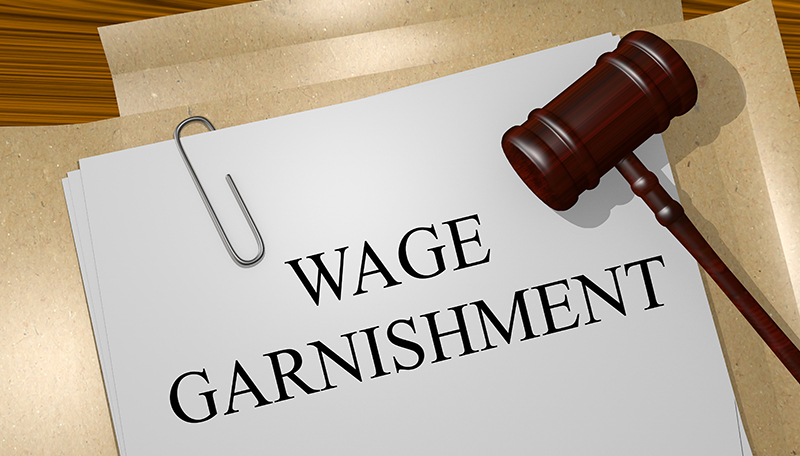Can you Negotiate a Wage Garnishment?
October 21, 2022 by Steve Banner, EA, MBA
Sometimes the IRS finds that taxpayers who have an outstanding tax debt are slow to respond to letters requesting payment. And some taxpayers with tax debts do not respond at all. This, of course, is understandable – who among us looked forward to going to the dentist when we were young? Or even now? And who looked forward to the end of the summer holidays so they could return to school? The logical side of our nature knew that having our teeth examined and continuing our education were both important and necessary to our future wellbeing. But our emotional side tried to ignore the looming deadlines in the hope that the moments we dreaded would never arrive. This “head-in-the-sand” strategy worked well for me – at least it did until my mother pulled me in to line and sent me on my way.
My mother was a schoolteacher and thus she knew many different methods to get my attention when necessary. In a similar way, we can look at wage garnishment as one of the methods that the IRS uses to get the attention of taxpayers who have ignored letters aimed at bringing them into line. Those letters may have gone unopened into a kitchen drawer, so they remain “out of sight, out of mind” to the taxpayer, but the threat of a wage garnishment may suddenly snap them back to reality. Under a wage garnishment, the taxpayer’s employer will withhold a significant portion of the taxpayer’s salary and pay it directly to the IRS, so the taxpayer cannot ignore the matter any longer.
This brings us back to our original question, which we can look at from two different angles:
- Can you negotiate to avoid a wage garnishment before it starts?
- Can you negotiate the amount of the wage garnishment?
Let us begin by reviewing how we might be able to stop the garnishment before it even starts.
Taxpayers with a debt owed to the IRS have several options at their disposal to make payment arrangements, such as installment agreements or periodic payments – all of which will avoid the need for the IRS to take the step of levying the taxpayer’s property or wages. This process does not happen suddenly, and the taxpayer is given numerous warnings and opportunities over the course of several months to prevent the IRS from taking this very serious action.
However, those taxpayers who fail to take advantage of the alternative options may eventually find themselves in a wage garnishment situation. In other cases, depending on the taxpayer’s financial circumstances, it may not be possible to come to an agreement with IRS for a payment plan or other agreement regarding the debt owed. Either of these conditions will lead us to the matter of the amount of the taxpayer’s salary that will be garnished.
The garnishment process usually begins with the IRS contacting the taxpayer’s employer and instructing them to take funds out of the taxpayer’s paycheck. The employer must send these funds to the IRS and, if it fails to do so, the employer itself may find it has acquired the liability for a tax debt of its own.
Negotiating the Amount of Wage Garnishment
Although the taxpayer had the opportunity to negotiate whether a wage garnishment would take place, there is no such negotiation available when it comes to the amount from each paycheck that will be withheld for the garnishment. This amount is calculated by allocating a set amount from each paycheck for the taxpayer to receive. The remainder of his salary, wages, commissions, and bonuses for the week will be sent to the IRS and used towards this tax debt.
The amount the taxpayer is allowed to keep from each paycheck is based on filing status and number of dependents. IRS Publication 1494 sets out the amounts that are exempt from garnishment. For example, a single taxpayer in 2022 with no dependents who is paid weekly may be left with as little as $249.04 in their paycheck each week.
Once it has begun, the garnishment will stay in place until is released by the IRS. This will take place when the taxpayer does one of the following:
- pays the tax bill in full,
- sets up a collection agreement,
- proves to the IRS that the garnishment is causing the taxpayer a financial hardship, or
- the period for collection of the taxpayer’s debt ends.
The above discussion makes it clear that the better course of action for a taxpayer who owes money to the IRS is to negotiate a collection agreement with the IRS and stop the wage garnishment before it even begins. More information about wage garnishments and how TaxAudit can help you may be found here.
Or you can call one of our experienced tax professionals at TaxAudit for a cost-free and obligation-free assessment of your case. He or she will help you figure out the best IRS tax debt settlement option for your situation, and you may never need to talk to the IRS.





